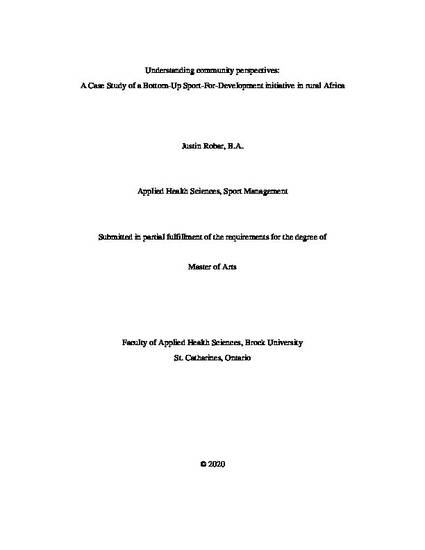
Thesis
Understanding community perspectives: A Case Study of A Bottom-Up Sport-For-Development initiative in rural Africa
(2020)
Abstract
The first wave of Sport for Development (SfD) initiatives made bold assumptions that sport was inherently good for participants and could achieve social and developmental outcomes (Levermore, 2008; Lyras & Peachey, 2011). Scholars began to question the impacts that SfD programs were having in achieving developmental goals and positive social outcomes (Coalter, 2013; Darnell, 2010; Schulenkorf; Sherry, & Rowe, 2016; Svensson & Levine, 2017). Researchers also conveyed that there were issues associated with race, power dynamics, Global North and South relations, cultural sensitivity, and gender apparent in SfD programs (Darnell et al., 2016). There has been shifts in the SfD sphere responding to this critical research to work closer with the communities and individuals who are the co-creators of these programs (Coalter, 2007, 2010; Collison & Marchesseault, 2018; Darnell, 2012; Van der Kleshorst, 2018). The purpose of this study was to understand how the community members who are co-creators and participants of this SfD initiative perceive the Bottom-Up approach and impacts of the program. The community that I worked with has been partnered with a SfD organization for eight years. A local gatekeeper (the rugby development officer) helped me understand the community and identify interviewees. Participants included: community members, parents, coaches, teachers, and former participants. During my time there I also participated in coaching seminars, worked with participants, and helped with education sessions. Using Stake’s (1995) case study approach, interviews, fieldwork, and content analysis were conducted. Utilizing these methods and incorporating qualitative data analysis techniques, four overarching themes emerged: Theme One; Community development through a sport-education centre; Theme Two; community interaction and engagement; Theme Three; development of participants; and Theme Four; Rugby development. The findings work to fill multiple gaps in literature identified by Schulenkorf et al. (2016) and attempt to address critical issues laid out by Darnell et al. (2016). This research also hopes to work as a bridge between academia and practitioners and makes recommendations for possible best practices moving forward in SfD that include; community engagement in development, upskilling local participants and community members, and seeking out feedback from the community members involved
Keywords
- Sport-for-development,
- Bottom-up,
- community development
Disciplines
Publication Date
Summer July, 2020
Degree
Masters of Applied Health Science
Field of study
Sport Management
Department
Sport Management
Advisor
Dr. Lisa Kikulis
Citation Information
Justin Robar. "Understanding community perspectives: A Case Study of A Bottom-Up Sport-For-Development initiative in rural Africa" (2020) Available at: http://works.bepress.com/justin-robar/2/
